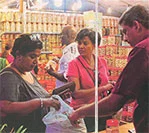IN his 2015 Budget speech, Prime Minister Datuk Seri Najib Razak stated the importance of striking a balance between the “capital economy” and the “people economy”. While achieving economic growth in quantitative terms, it is imperative to make sure that the growth translates to increased well-being of the people.
A people’s economy upholds the priorities and interests of the rakyat, no matter where they stand on the social spectrum. The social and solidarity economy (SSE) is of particular interest as a subset of the people economy, as it includes a broad array of organisations and enterprises which produce goods and services with explicit social and environmental objectives on top of their economic goals. Co-operatives, social enterprises, and nonprofits that run economic activities to sustain themselves fall under this umbrella.
The SSE is an important part of the Malaysian economy. For instance, the cooperative sector had a turnover of about RM33 billion in 2013. The government has shown support through several policy measures, such as long-term planning for the cooperative sector in the form of the National Cooperative Policy (2011-2020), and allocating RM20 million for a Social Business Fund to aid local social enterprises.
However, the economic value of the SSE is only part of the story, as the true potential of the sector is actualised by using economic activities as a vehicle to achieve far more important ends, such as strengthening social capital and the community spirit amongst the people, and enabling them to live meaningful and dignified lives.
As a researcher in the field, with this broad vision in mind, I would like to offer a few suggestions to maximise the outcomes of a socially-oriented economy.
FIRSTLY, we should focus on empowerment, rather than entrepreneurship. Empowerment is the process of enabling people to increase control over their lives, as well as the factors and decisions that shape their lives. Entrepreneurship, on the other hand, is the capacity to start and run a business.
While instilling entrepreneurship in Malaysians is useful, we risk missing the forest for the trees -as the economy is a means to improve human well-being, and is not an end in itself. Empowerment has a much larger scope in shifting extrinsic motivation to intrinsic, inspiring people to believe in their own capacity and act by their own volition, to change their lives for the better. Entrepreneurship, among other self-improvement skills, will then follow.
SECONDLY, we should focus on community-building, rather than individual social entrepreneurs. The story about a lone underdog beating all odds to save the world is a satisfying one to narrate; however, realistically it is more an exception than the rule. A socially oriented economy should foster the right environment for trust and solidarity to bloom, resulting in strong social networks among the people.
Studies have shown that communities with higher social capital are more resilient in the face of disaster, with fewer casualties than communities that are individualistic. A vignette in the recent floods comes to mind -a village in Lipis had pooled the villagers’ money to buy food and materials to be shared in the community-operated flood relief centre, stretching their supplies and minimising wastage. Although strongly motivated individuals can help, such organisation cannot be accomplished without a strong sense of community.
A people’s economy upholds the priorities and interests of the rakyat, no matter their social standing
THIRDLY, we should focus on values and principles, rather than key performance indicators. This boils down to an emphasis on the quality of growth rather than quantity, necessitating a shift in how we regard success. Not only through numbers like income per capita, but through a more nuanced assessment: are we doing things with the right motivation? What values and principles are important to us as a nation? Are we willing to forgo short-term economic gains for sustainable well-being in the long term, if more time and effort are needed for proper implementation of good policies?
All these considerations matter when we are tailoring and implementing policies for the SSE in Malaysia, and indeed, for the wider scope of sustainable development of the country. Proponents of the SSE themselves and actors within the field should also continually revisit the essence of their work, to ensure that they do not drift away from the raison d’etre of why they ventured into the field in the first place.
The recent years have shown that we are living in trying times, facing increasing uncertainty in terms of environmental disasters and economic turbulence. It is during these times that the resilience of the society is tested, and it is during these times when having an empowered populace with strong community networks based on shared values and principles will matter the most.
Article by Dr Jun-E Tan which appeared in New Straits Times, 10 February 2015.





